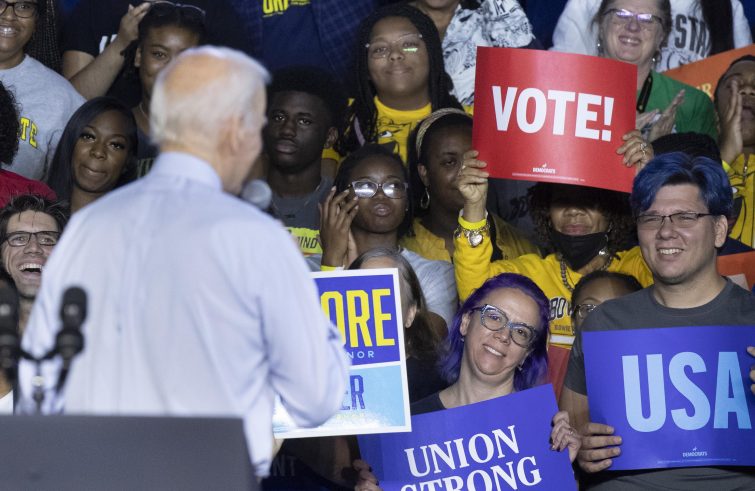
(from New York) On the final Midterm election day US citizens will decide the future of Joe Biden’s presidency and the election prospects of former President Donald Trump – although he is not running in the Midterm. US citizens are called to vote to elect all 435 members of the House of Representatives with one third of the Senate up of grabs – i.e. 35 senators. The latest polls suggest that US voters will award Congress to the Republicans (GOP) and thus deadlock the presidential agenda. President Biden chose Maryland as the venue of his closing remarks yesterday: he highlighted the accomplishments of his administration and underlined the risks posed to democracy in the country if the GOP were to win. Trump opted for Ohio and his Truth Social platform to renew his allegations of rigged election results, especially in Pennsylvania, with a toss-up contest between the two candidates running in the Senate race. The battleground states where the Democratic Party establishment is in danger of being ousted by extremist Republican candidates are Arizona, Colorado, Georgia, Nevada, New Hampshire, North Carolina, Ohio, and Pennsylvania: this is where the election campaign events were mostly centred, including those of Biden, Obama, and Trump last Saturday.
The topics. The Midterm election debates focused primarily on the issues of abortion, sluggish economy, slavery, crime. The Democrats in particular made access to abortion a key campaign issue, notably after the Supreme Court overturned the Roe v. Wade ruling that decriminalised abortion nationwide. Federal States are now in charge of handling and directly evaluating this major social issue. After Kansas voters rejected past August a proposed state constitutional amendment that would end protections for abortion, four other states are set to consider, along with the renewal of Congress, holding referendums to limit access to the procedure, as Kentucky plans to do, or to establish it as a right, as expected in California, Michigan and Vermont. President Joe Biden vowed that Democrats will codify the right to an abortion into law if more are elected to the U.S. Senate and if the party retains a majority in the House. But Americans seem to be more concerned about the economy.
A Quinnipiac research centre poll released in November found that only 10% of voters considered abortion as a major issue in the Midterm, while 36% said inflation was the key question, with families slowly strangled by rising prices amidst warnings of a looming recession.
US citizens will also be voting to outlaw slavery, that remains legal as a punishment in some States’ constitutions; to raise minimum wages; to legalise marijuana; to curb climate change; and to amend voter ID laws.
The numbers. A total of 41 million voters chose to vote early, Georgia leading the way after fraud allegations were brought against the State in the past presidential elections. Meanwhile, Republican officials in various states filed lawsuits to make voting by mail more complex and claims of minor procedural flaws, such as the wrong date marked on the ballot envelope, which has already invalidated 7,000 ballots in Pennsylvania and 2,000 in Florida. The GOP is urging in-person voting, so as to mark a sharp separation with the Dems leaning towards mail-in voting. Looking at the numbers, 28 Republicans are likely to win 28 seats in the House, while 36 States will elect new governors. The total Midterm election spending is expected to top $16.7 billion, $270 million of which was spent on advertisements.
Trump and the GOP’s identity. Although the former President is not directly entering the race, the Midterm elections will determine whether his political future in the Republican Party will be smooth or uphill. Trump has chosen and supported his candidates, who have outperformed those selected by the Party in a number of primary elections.
Their win in Congress would also be a victory for the former US president, expected to announce his re-run for the White House before long, should the Midterm elections prove him right. Several candidates turned him back fearing that voters would change their minds; others urged him to emphasise his political choice, also in support of the latest rhetoric concerning rigged election results.
Some of the ex-president’s supporters organised armed militias in Arizona stationed near mailboxes used for postal voting with the aim of intimidating voters. However, one judge prohibited such stakeouts.
Faith. Religion was a recurring topic of the 2022 election campaign, with candidates and various political figures making use of and invoking biblical images in their rallies and demonstrations, in the belief that God is on their side in their heavenly-inspired struggle against evil. Some candidates advanced the notion that the United States – explicitly founded with no official state-endorsed religion – should return to being a “Christian nation”, subject to biblical tenets and run by God-inspired leaders, such as Donald Trump, who frequently declared: “We are ONE movement, ONE people, ONE family, and ONE glorious nation under God.” Latino registered voters – the fastest growing group within the US electorate – in Texas, Arizona and Florida, led by their pastors, said they lean towards the conservative party. Data from the Pew Research Centre based on voter polling preferences, found that differences between candidates were rated on the basis of religion. Fifty percent of Latino Evangelicals said they would vote for a Republican candidate for the House, while the majority of Latino Catholics (59%) and non-religiously affiliated (60%) said they would vote for a Democratic candidate. Meanwhile, in the wake of Trump’s ‘Make America Great Again’ movement, a Texas pastor created the group ‘Make America Godly Again’.









